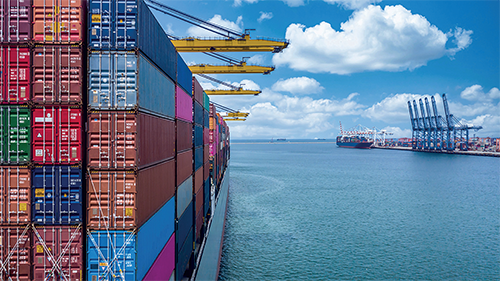Jonathan Taylor explains how to promote greener ways of working in the maritime sector
Steps in the right direction
The global maritime industry has set its sights on transitioning to Net Zero carbon by 2050, but decarbonizing the sector will not be an easy journey. To align with the International Maritime Organization’s (IMO) 2050 target, a sizeable number of the world’s 100,000 vessels will need to reduce emissions by 40 percent by 2030. And that’s not all, as the UK government has set its own target to reduce shipping emissions by 78 percent by 2035 as part of its wider Net Zero ambitions.
 Ninety-five percent of British imports and exports are transported by sea, and cargo ships alone release around one billion tons of CO2 emissions every year. As the equivalent of three percent of total global emissions, it’s clear the industry has a huge mountain to climb.
Ninety-five percent of British imports and exports are transported by sea, and cargo ships alone release around one billion tons of CO2 emissions every year. As the equivalent of three percent of total global emissions, it’s clear the industry has a huge mountain to climb.
While this paints a challenging picture, there is reason to be positive. The sector is aware that decarbonization is a priority and there are practical steps we can take.
Collaboration is key
Sustainability is an issue that affects every aspect of and player in the industry – it cannot be achieved by acting in silos. A collaborative approach will be the cornerstone of success. This means regulators, manufacturers, technology companies, governments, academia, and others bringing their skills, experience and outlook to the table to solve challenges.
This collaboration shouldn’t end with the traditional maritime ecosystem though.
Green engineering will play a crucial role in achieving Net Zero and has already positively impacted the automotive industry, which is leading the way in adopting electric and hydrogen fuel cell technology. These learnings and advances can be applied and adapted to the maritime industry to jump-start sustainability projects.
Creating a collaborative environment will help to bring passionate individuals together who understand the meaningful impact of decarbonizing – a crucial first step in propelling the marine industry towards its green ambitions.
Step-by-step to success
There is an awareness that there is no silver bullet when it comes to decarbonization. No single technology will eliminate greenhouse gas emissions overnight. The road to Net Zero will be an incremental process.
Today, the global shipping fleet numbers around 100,000, acting as the main artery for global commerce and economic activity. The average vessel has a 30-year lifespan and estimates suggest the majority of those on the sea today will still be operational in 2035. Replacing the fleet in one go is neither practical nor economically viable so we need to look at the short-term measures we can take alongside the long-term changes required and accept that we might not see tangible results for a number of years.
Retrofitting today’s fleet to become more sustainable is an often overlooked option. By retrofitting to adopt new fuel sources, means of propulsion and adapting modes of operation, we can cut emissions quickly and meet interim Net Zero goals. Efficient ship design and provisioning with new technologies will help to significantly reduce fuel consumption and greenhouse gases – leading to better performance, efficiency gains and cost savings.
 In parallel, work can be done to develop new vessels built from the ground up to be Net Zero, with solutions and design profiles tailored to their power requirements and operational profile.
In parallel, work can be done to develop new vessels built from the ground up to be Net Zero, with solutions and design profiles tailored to their power requirements and operational profile.
Alternative fuel sources
When we look at fostering a green future for maritime, we must consider how we fuel our vessels. Over-reliance on fossil fuels is perhaps the biggest single issue to solve.
‘Going green’ is often associated with an additional cost that doesn’t offer direct ROI. But a move to new fuel sources has the potential to prove more cost-effective. Sixty percent of the lifetime cost of a vessel is attributed to fossil fuels, and the maritime industry will also be able to save money by using more cost-effective carbon-neutral options. Just this year, Expleo developed a closed-loop e-methanol fuel solution for shipping to deliver a 92 percent reduction in Greenhouse Gas (GHG) emissions and potential OPEX savings of £1.4 million a year, per vessel.
Hydrogen and methanol are just two fuels being explored, but to ensure uptake they need to guarantee comparable performance compared to fossil fuels. Hydrogen and methanol both require more on-board space to store, so the immediate focus should be on designing new and efficient ways to minimize this using smart technologies like AI.
The role of Artificial Intelligence (AI)
While much focus is placed on traditional engineering – the fuels and engines driving the global fleet – digital technology should also support maritime’s push for sustainability.
A significant proportion of its carbon footprint can be traced back to inefficiencies in the operation of ships. By making shipping smarter, it can become greener too. Although its application in shipping is relatively immature, AI has the potential to be a gamechanger, due to its ability to be applied to a broad range of challenges. AI can be used to track real-time fuel consumption and make vessels more efficient, predict energy consumption, identify optimal system, trim, speed and engine settings to reduce emissions.
AI can also help seafarers make better decisions by monitoring real-time data around sea and weather conditions. With this visibility, crews will be able to optimize how the ship should be sailed and consider when best to recharge, use more fuel or start up generators.
AI technology is developing all the time, and we are just beginning to understand what is possible.
No quick fixes
While the route ahead will have its challenges, progress is already being made. I believe the maritime industry can inspire other sectors to a greener future. An emphasis on collaboration, continued investment in innovation and embracing digital and emerging technology will be the three pillars of future success.
It’s an innovative time for the maritime sector and by pushing boundaries, bringing great minds together and taking inspiration from other industries, we can work to solve the decarbonization challenges ahead.
For a list of the sources used in this article, please contact the editor.
Jonathan Taylor
www.expleo.com/global/en/
Jonathan Taylor is Vice President of Marine at Expleo, a global engineering, technology and consulting service provider that partners with leading organizations to guide them through their business transformation, helping them achieve operational excellence and future-proof their businesses. Expleo leverages a network of high value-adding affiliates in consulting and industrial excellence, and leading partners across multiple sectors to provide you with the most comprehensive services and solutions in an ever-changing environment.
